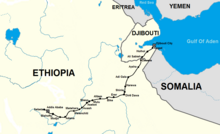
The economy of Djibouti is derived in large part from its strategic location on the Red Sea. Djibouti is mostly barren, with little development in the agricultural and industrial sectors. The country has a harsh climate, a largely unskilled labour force, and limited natural resources. The country's most important economic asset is its strategic location, connecting the Red Sea and the Gulf of Aden. As such, Djibouti's economy is commanded by the services sector, providing services as both a transit port for the region and as an international transshipment and refueling centre.
Transport in Djibouti is facilitated through a relatively young system of roads, railways and ports.

Transport in Ethiopia is overseen by the Ministry of Transport and Communications. Over the last years, the Ethiopian federal authorities have significantly increased funding for rail and road construction to build an infrastructure, that allows better economic development.
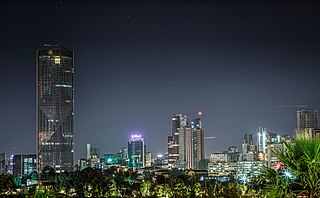
Addis Ababa is the capital and largest city of Ethiopia. In the 2007 census, the city's population was estimated to be 2,739,551 inhabitants. Addis Ababa is a highly developed and important cultural, artistic, financial and administrative center of Ethiopia. It is widely known as one of Africa's major capitals.

Ismaïl Omar Guellé is a Djiboutian politician who has served as the President of Djibouti since 1999, making him one of the longest-serving rulers in Africa. He is often referred to by his initials, IOG.
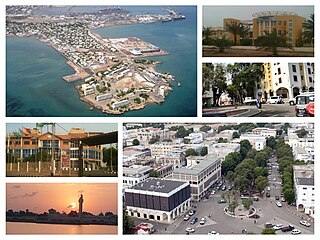
Djibouti is the capital city of the Republic of Djibouti. It is located in the coastal Djibouti Region on the Gulf of Tadjoura.

Gambela, also spelled Gambella, is a city and separate woreda in Ethiopia and the capital of the Gambela Region. Located in Anyuak Zone, at the confluence of the Baro River and its tributary the Jajjabe, the city has a latitude and longitude of 8°15′N34°35′E and an elevation of 526 meters. It is surrounded by Gambella Zuria.
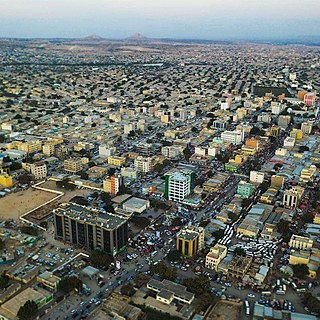
The economy of Somaliland largely relies on primary production and agriculture, where livestock is the main export of the country, which it ships to neighbouring Djibouti and Ethiopia, as well as to Gulf states, such as UAE, Saudi Arabia and Oman. Somaliland has a GDP per capita of $1361 and a gross domestic product GDP of $7,583,000,000 as of 2024, most of which it receives in remittances from Somalis working abroad. The COVID-19 pandemic has restricted Somaliland's trade flows with decreased demand in the agriculture sector, a significant source of tax revenue.
Rail transport in Ethiopia is done within the National Railway Network of Ethiopia, which currently consists of three electrified standard gauge railway lines: the Addis Ababa–Djibouti Railway, the Awash–Weldiya Railway and the Weldiya–Mekelle Railway. Other lines are still in the planning phase. There is also an urban light rail system in the country's capital, the Addis Ababa Light Rail.
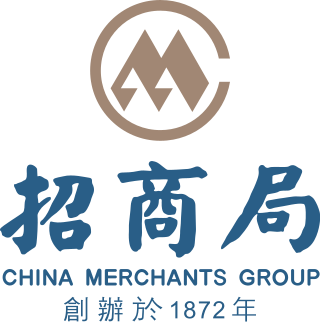
China Merchants Group Limited is a state-owned enterprise (SOE) of the People's Republic of China. The company operates under the auspices of the Chinese Ministry of Transport.

The Port of Djibouti is a port in Djibouti, the capital of Djibouti. It is strategically located at the crossroads of one of the busiest shipping routes in the world, linking Europe, the Far East, the Horn of Africa and the Persian Gulf. The port serves as a key refueling and transshipment and also transport means center, and is the principal maritime outlet for imports to and exports from neighboring Ethiopia. An estimated 2,500 ships pass through and call through the port annually.

Djibouti, officially the Republic of Djibouti, is a country in the Horn of Africa, bordered by Somalia to the south, Ethiopia to the southwest, Eritrea in the north, and the Red Sea and the Gulf of Aden to the east. The country has an area of 23,200 km2 (8,958 sq mi).

Current railway stations in Ethiopia are served by standard gauge railways of the National Railway Network of Ethiopia which is mostly under construction, except the Addis Ababa–Djibouti Railway. Other stations were built for the in 2018 still operating metre gauge Ethio-Djibouti Railways, although this railway has officially been superseded by the new Addis Ababa-Djibouti Railway.

The Ethio-Djibouti Railway is a metre gauge railway in the Horn of Africa that once connected Addis Ababa to the port city of Djibouti. The operating company was also known as the Ethio-Djibouti Railways. The railway was built in 1894–1917 to connect the Ethiopian capital city to French Somaliland. During early operations, it provided landlocked Ethiopia with its only access to the sea. After World War II, the railway progressively fell into a state of disrepair due to competition from road transport.
Rail transport in Djibouti is administered through the Ethio-Djibouti Standard Gauge Rail Transport Share Company, a bi-national company between Ethiopia and Djibouti to manage the only railway in Djibouti, the electrified standard gauge international Addis Ababa–Djibouti Railway. This railway opened on 1 January 2018 replaced the international metre gauge railway from Djibouti's capital Djibouti City to the Ethiopian capital Addis Ababa, which was officially decommissioned in 2016.
Railway stations in Djibouti are served by standard gauge railways of the Djiboutian Railway Company.

The Addis Ababa–Djibouti Railway is a standard gauge international railway that serves as the backbone of the new Ethiopian National Railway Network. The railway was inaugurated by Prime Minister Hailemariam Desalegn on January 1, 2018. It provides landlocked Ethiopia with access to the sea, linking Ethiopia's capital of Addis Ababa with Djibouti and its Port of Doraleh. More than 95% of Ethiopia's trade passes through Djibouti, accounting for 70% of the activity at the Port of Djibouti.
The Port of Doraleh is an extension of the Port of Djibouti, located 5 km west of Djibouti City. The multipurpose port has terminals for handling oil, bulk cargo, containers and livestock. It was partially owned and operated by DP World and China Merchants Holdings, until its container facility was seized by the government of Djibouti in February 2018. China’s first overseas military base is near the port.

Nagad Railway Station is the new and only passenger rail station of Djibouti City, the capital of Djibouti.


